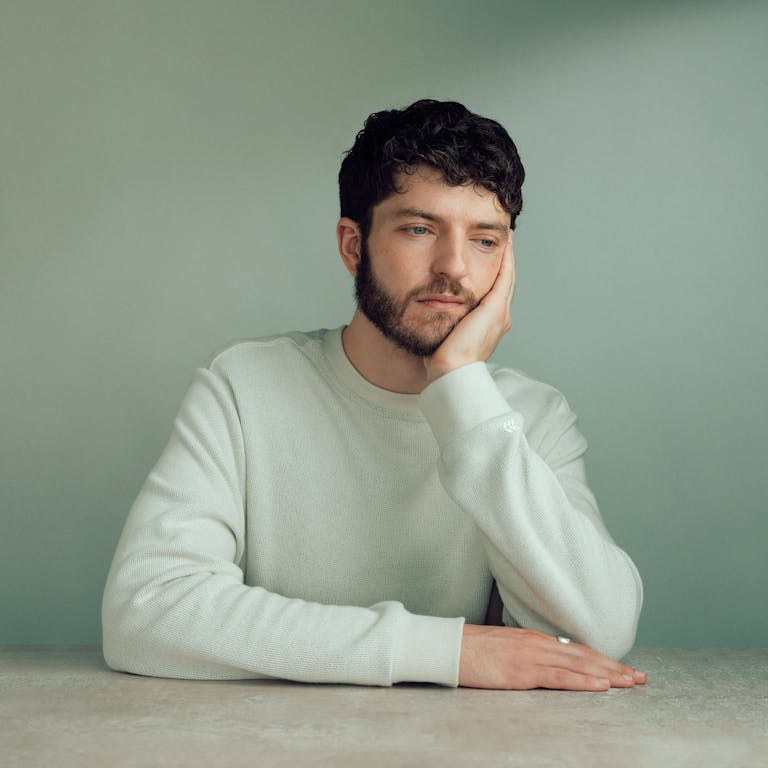33
- Rita Frances Welch

- Mar 26, 2024
- 3 min read
Updated: Mar 27, 2024


33 receives its world premiere as part of United Solo's 2024 Spring Festival. The piece is written and performed by actor and writer John Selby, who approaches the solo format as the character Harry Brooks, a writer using his craft to process his grief. The play was first developed at LAMDA, as Selby's thesis, and takes inspiration from the work and life of William Shakespeare.
Selby moves through the fictional Harry Brook's life out of sequence, sharing key moments in his journey. His first major arc, which he returns to later in the performance, portrays how he meets his wife in an NYU office. This section of the story was rife with physical comedy, wit, and excitement. We get to see Brooks finding joy and wonder in everyday moments. This sequence really helps build Brooks' bond with the audience. Once the story progresses to its main subject matter, the death of Brooks' son, I was unsure how that earlier sequence tied into the rest of the piece.
Harry Brooks spends his time working on a soon-to-be bestselling novel, though what the novel is about seems to change at different points in the performance. In the introduction, it concerns a fireman named Mason Stone and is meant to be a thriller/action story. In a later sequence, once the book is a success, Brooks gives a public reading of the story titled, 'Mason Stone.' It now concerns an imagined version of Brooks' deceased son, William and his wife, Anne, both of whose 'real names' are used in the novel. This created a rift in the suspension of disbelief, making it harder to stay engaged with the story's important moments.
Selby infuses the work of William Shakespeare, particularly Sonnet 33, into the performance. Selby theorizes Shakespeare's inspiration for this sonnet, which deals with a heartfelt loss, may have come from losing one of his children. Selby reads this sonnet to the audience as part of Brooks' public novel reading, staging it as an epilogue to his novel. However, Selby's performance of this sonnet feels more like an actor's performance than an author's reading- his eyes are directed upwards like an actor in a soliloquy calling upon the gods, and the emotions are projected externally. It would be interesting to see Selby use this sonnet more intimately- as an opportunity to glimpse into how this sonnet personally affected Brooks, how he felt about reading it in front of the crowd, which lines were his favorite, and how it inspired him as a writer.
The piece conjures a lot of interesting imagery and descriptions. They are present in Brooks' writing selections and how he narrates the life he imagines for his lost child. They shine in his narration and how he talks through simple moments of life. Scenes of love, hope, joy, despair, and new beginnings are all universal experiences even Shakespeare tackled in his life. It was not until a bit after the performance that I began to understand what Selby wanted audiences to walk away with-- an understanding that our griefs are part of the composite of ourselves and so are new beginnings.
"33"
Written and Performed by John Selby
March 16, 2024
The 16th United Solo Festival
March 4 – April 28, 2024
Theatre Row
410 West 42nd (btw 9th and 10th Avenue)

Rita Frances Welch is… Wait, who’s asking? There are a few answers depending on the context. Rita is A) A New York playwright, actor, and director, B) The owner of 5 discrete copies of Shakespeare’s The Tempest, C) A force of nature, controlled by the tides and called to by the wind, disappearing and returning like the seasons. More material than their author, Rita’s plays have been produced by The Tank, Theatre X, Playwrights Performance, and Rogue Theatre Festival. They hold a B.F.A. in Acting from Shenandoah Conservatory, during which they studied under LAByrinth Theater’s Martha Wollner and Padraic Lillis. Rita’s writing functions as an experiment- a combination of characters in the petri dish of their world, their personal challenges and delusions in a vacuum, isolating for every variable but one: Human nature, which reveals itself every time. ritafranceswelch.com



The nonlinear structure, moments of physical comedy, and early scenes of joy successfully build a connection between Harry Brooks Geometry Dash and the audience, making his later loss more impactful in intention. However, the play struggles to fully unify its narrative elements. The unclear connection between the lighter opening arc and the central theme of grief, along with inconsistencies surrounding the novel within the story, weakens the suspension of disbelief.